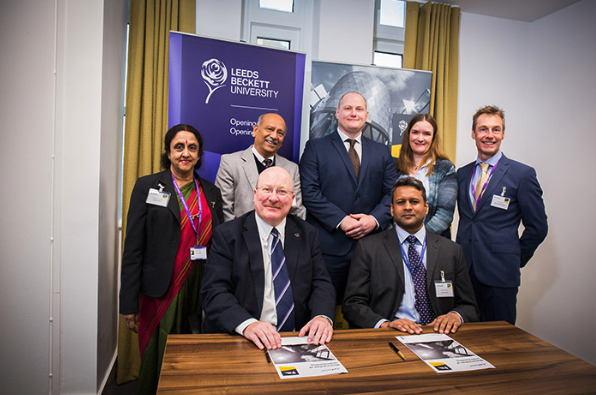Channels
Special Offers & Promotions
New University Partnership to Shape the Future of Medical Technology
Leeds Beckett University and global research and development company, Axxonet Global, have announced an official partnership which will see the organisations collaborate on cutting-edge medical diagnostics and technology, forensic science and digital security projects.
 The signing of an official Memorandum of Understanding (MoU) agreement follows the successful work that Leeds Beckett has been carrying out with Axxonet Global Limited and its Indian partner, Axxonet System Technologies India, over the last year, developing assistive technologies for medical systems, supporting age-related disorders and Parkinson’s disease.
The signing of an official Memorandum of Understanding (MoU) agreement follows the successful work that Leeds Beckett has been carrying out with Axxonet Global Limited and its Indian partner, Axxonet System Technologies India, over the last year, developing assistive technologies for medical systems, supporting age-related disorders and Parkinson’s disease.
The partner organisations will engage in joint research and development projects in the areas of physical and mental health, medical technologies, digital health applications, forensic sciences and cyber and digital security, as well collaborating in bidding for future research funding and in the delivery of distance learning courses.
Dr Duncan Sharp, Dean of the School of Clinical and Applied Sciences at Leeds Beckett University, said: “We are delighted to sign the MoU with Axxonet, who are an exciting and innovative company. This partnership brings a fantastic opportunity to our University and we are currently exploring the application of the technological innovations Axxonet bring across a number of sectors.
“From the perspective of the School of Clinical and Applied Sciences, we believe that our shared passion and vision for enhancing health and social care through innovative technologies will be an important element of this partnership and one with potential for international impact, as well as across Leeds and the West Yorkshire region.”
Researchers in the School of Clinical and Applied Sciences, led by Dr Sareen Galbraith, Senior Lecturer in Biomedical Science, are collaborating with Axxonet and Dr Walied Mowafi at Calderdale and Huddersfield Foundation NHS Trust, to develop sensitive, and reproducible, sensor measurement for use in patients with Parkinson’s Disease. The project has won £5,000 funding from Translate, a new partnership of universities in the Leeds City Region with world-class expertise in the development of new medical technologies.
Dr Galbraith explained: “One in 550 people in the UK has Parkinson’s disease, costing £2 billion annually. Parkinson’s is a chronic and progressive movement disorder, characterised by tremors, stiffness, slowness of movement and balance problems. It is caused by loss of the neurons in the substantia nigra neurons which produce dopamine – a neurotransmitter involved in motor control, for example, upper limb movement.
“One aspect of Parkinson’s is slowness of limb movement. Treatment of Parkinson’s aims to reduce this and increase the patient’s ability to carry out everyday activities. Our research with Axxonet aims to develop sensitive and reproducible sensor measurements of movement in Parkinson's disease patients that will complement the specialist neurological assessment.”
Chetan S Mukundan, Director of Axxonet Global Limited, said: "We are delighted that Leeds Beckett University is anchoring Axxonet's translational research and development efforts. In Leeds Beckett, Axxonet has found an agile, dynamic, academic and research partner to enable global expansion in offering cutting-edge technology in the areas of healthcare, knowledge and skill development and homeland security.
“We have initiated research in the area of Parkinson’s disease, and plan to collaborate on important issues like dementia and cyber security.
"When our researchers at Axxonet created Clasp - a high precision multi-sensory glove, little did they envision that Dr Sareen Galbraith's team would be able to apply the technology to Parkinson’s disease, a serious and debilitating health condition that is increasing in incidence. This is a perfect example of translational research with direct, measurable and immediate social, health and economic benefits."
Dr Simon Grant, Clinical Director of Integrated Medical Specialities, at Calderdale and Huddersfield Foundation NHS Trust, said: “We are delighted to be taking part in this exciting project. The project uses the latest technology with the potential for accurate assessment of an aspect of Parkinson’s disease that has previously only been very loosely assessed by eye at one point in time. This could easily have implications for monitoring and adjusting treatment.”
more about leeds beckett university
Media Partners


